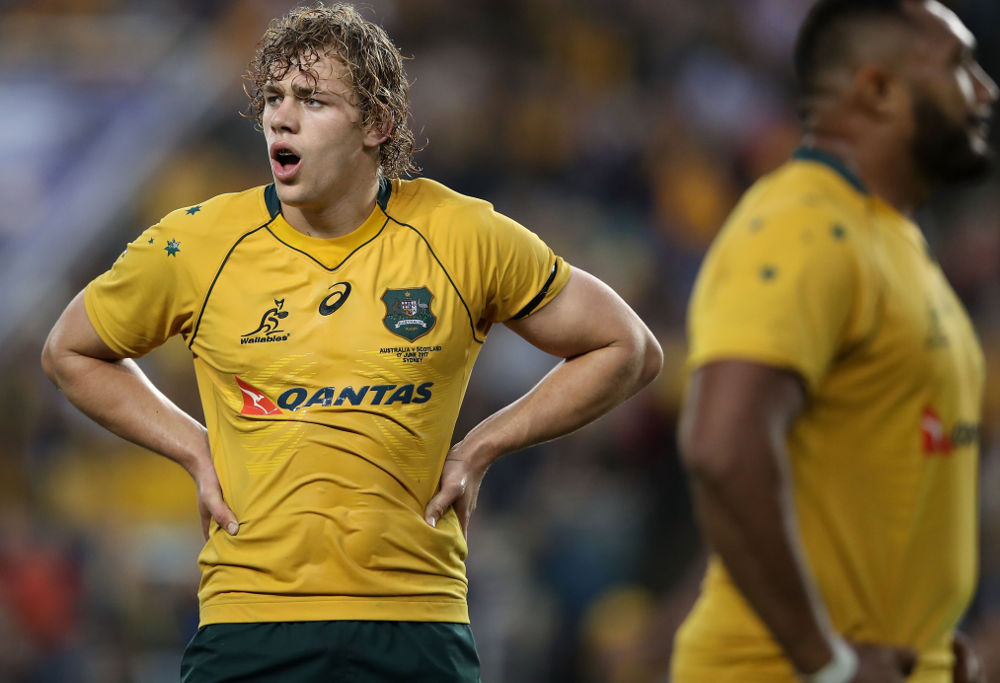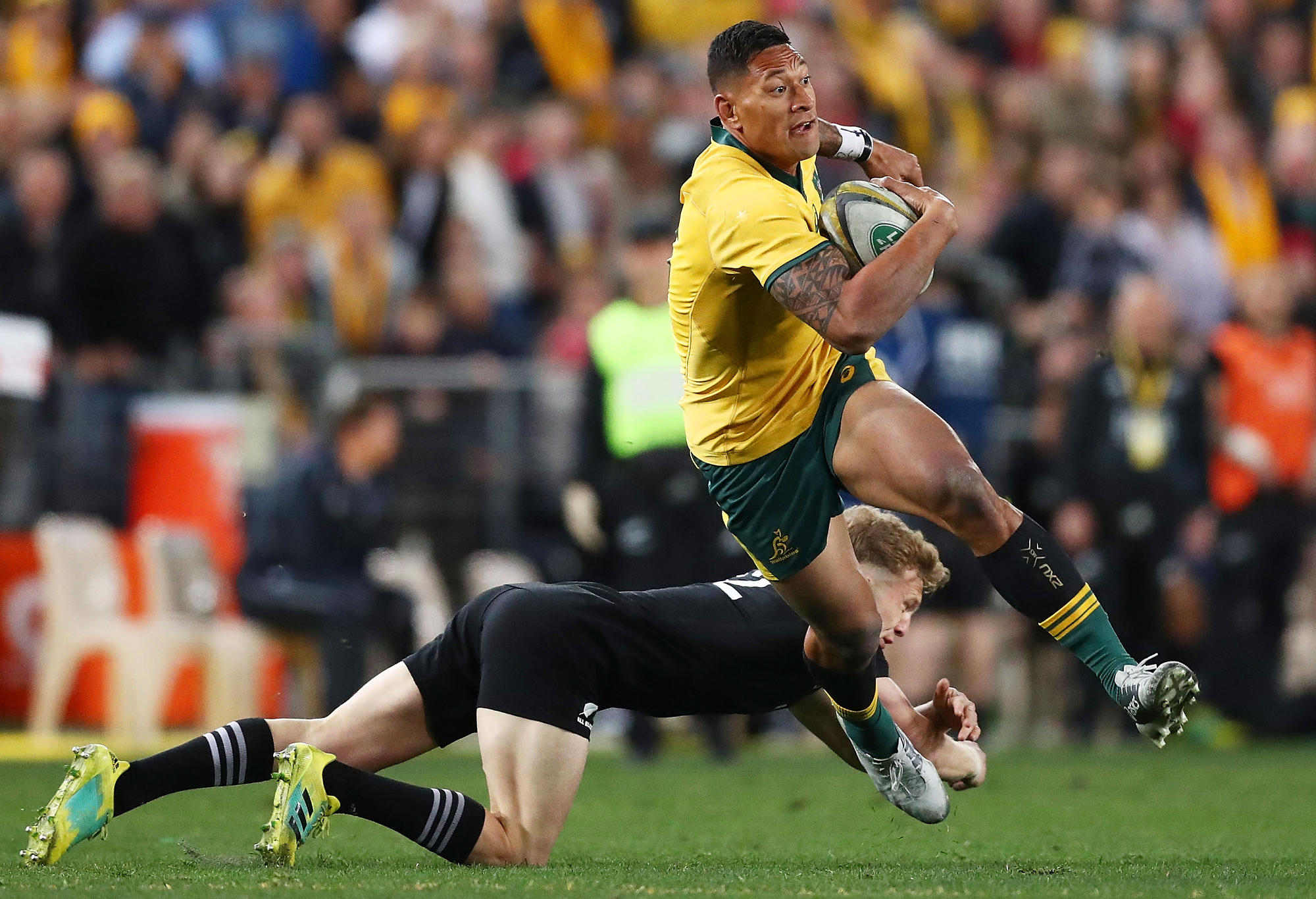Cussell Roight
new author
Roar Rookie
So, here we are again, watching the Wallabies off the pace and off their game in yet another Bledisloe loss.
My fellow Roarers have raised a number of excellent points in the wake of Yokohama and, by in large, I agree with the following.
1. Unforced errors (offensive and defensive) are letting us down;
2. Specific players are becoming fatigued and would benefit from a break (i.e. Will Genia);
3. Cheika needs to play his squad members in the positions they are best at.
To my mind, the key area here is unforced errors.
Izack Rodda and Dane Haylett-Petty have rightly been identified as knock-on culprits but I’m not just talking about poor handling.
I’m talking about the simple roles and duties expected of each individual player in the team.
Take Kieran Read’s try, for instance, where we bear witness to a skills and communicative failure from our blindside flanker (Ned Hanigan) and our halfback (Genia).
Hanigan’s responsibility as a blindside flanker on the scrum is two-fold: support and drive the prop in contact and then defend/mark the first blind side attack (either the number eight or halfback).
At Test level, it should be an expectation that your 6 and 9 are constantly communicating at scrum time.
The halfback should be in this situation as all traditional halfbacks are on the paddock – a bloody nuisance hollering at his loosies to tell them where the play is going and who to look out for.
When the ABs packed down for that scrum with a stacked blindside in the 35th minute, the first thing Genia should have been doing is talking to Hanigan, pointing at Read, screaming out who he’s marking.
In this case, Genia has correctly shifted to cover Beauden Barrett while Israel Folau is marking Reiko Ioane, however, Genia has not alerted Hanigan to the threat, nor does he communicate to him that Read is breaking off the back.

Ned Hanigan of the Wallabies. (Photo by Mark Kolbe/Getty Images)
The result is simple – Genia shifts to Barrett without alerting Hanigan to Read’s movements and the All Blacks skipper crashes through a passive tackle to score in that crucial ten-minute window either side of half time.
It’s also important to note the subtle role played here by TJ Perenara, who has held his ground after feeding the ball and in so doing subtly impeded Hanigan’s running line to intercept Read.
Unlike Aaron Smith’s hotly debated running line for Ben Smith’s try, Perenara’s actions here are both totally legal and highly intelligent.
But back to the communication here, because the focal point here is that communication is a skill and, like many other skills, the Wallabies are really struggling to master it.
So, my question to the floor is this: what positive impacts, if any, are Nathan Grey and Mick Byrne having on the Wallabies?
Let’s focus on Grey first.
The former Tahs assistant was elevated to the role of Wallabies defence coach in 2015 and was rightly praised after a gritty World Cup campaign featuring huge defensive efforts against Wales and England in the pool stages.
Since then, the shine has worn off for Grey – a man renown for his own physicality as a player – and the Wallabies defence has been suspect.
Australia has lost 21 and drawn two of its 45 Tests since the 2015 World Cup, leaving them with a less than flattering 43.6 per cent winning record.
In the 21 games lost during that period, the Wallabies conceded 84 tries – clocking in at a perfect four tries against per game.
When you put that against the number of tries for during that period (48 for an average of 2.3 per game), we’re seeing a pretty clear deficiency with our defence and the buck ultimately stops with Grey.
Here’s a quick snapshot from this year’s Rugby Championship:
Missed tackles – Australia (155), New Zealand (134)
Clean breaks – Australia (77), New Zealand (107)
Put those two stats together and it’s clear the Wallabies are off the pace both defensively and offensively.
Which leads me nicely to Byrne.
Byrne came into the national coaching set-up in 2016 after an extended stint with the ABs and came him serious rep, though much of that undoubtedly came from RA’s own horn-tooting.
A Wallabies kicking coach back in ‘88, Byrne had also assisted with Japan and Scotland before settling across the ditch during possibly the best era of New Zealand rugby and picking up plenty of silverware.
I personally had really high hopes when Byrne came to town and anticipated a stronger catch-pass game along with more astute decision making when it came to offloads and converting line breaks into tries.
Two years on, I’m not sure whether we’re seeing massive improvements in that field.
Our attack was certainly improved in Yokohama but last passes and handling errors continue to plague try-scoring opportunities.
New Zealand’s TRC conversion rate from clean breaks (107) to tries scored (33) comes in around 31 per cent while Australia (77 clean breaks to 16 tries scored) sits at 21 per cent.
Meanwhile, the All Blacks are still streets ahead of the Wallabies when it comes to key attacking areas like defenders beaten (198 to 137), offloads (60 to 47) and metres per carry (4.1 to 3.3).

Israel Folau (Photo: Mark Metcalfe/Getty Images)
Surely these are the areas in which Byrne is supposed to be making progress in – after all, he was touted as the skills mastermind behind the All Blacks’ success.
So, with handling an area of concern, tries drying up from 2017 to 2018 and near clear areas of improvement in attack, is Byrne even making a difference?
I guess my point is as follows – yes, the Wallabies are making on-field errors and have been doing so for a number of years now, but coaches are hired to improve and develop teams into better and more cohesive units.
Looking at the statistics since Australia’s RWC GF loss, I don’t think the addition of Grey, Byrne, and by extension, attack coach Steve Larkham, have necessarily bettered the Wallabies.
Over to you, Roarers.